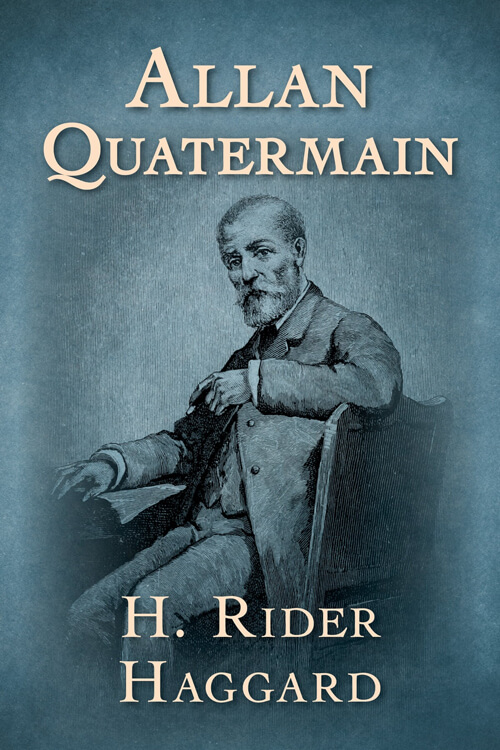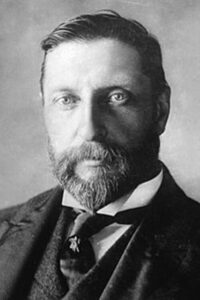
Allan Quatermain
‘I have just buried my boy, my poor handsome boy of whom I was so proud, and my heart is broken. It is very hard having only one son to lose him thus, but God’s will be done. Who am I that I should complain? The great wheel of Fate rolls on like a Juggernaut, and crushes us all in turn, some soon, some late—it does not matter when, in the end, it crushes us all. We do not prostrate ourselves before it like the poor Indians; we fly hither and thither—we cry for mercy, but it is of no use, the black Fate thunders on and in its season reduces us to powder.
‘Poor Harry to go so soon! just when his life was open to him. He was doing so well at the hospital, he had passed his last examination with honors, and I was proud of them, much prouder than he was, I think. And then he must need to go to that smallpox hospital. He wrote to me that he was not afraid of smallpox and wanted to gain the experience, and now the disease has killed him, and I, old and grey and withered, am left to mourn over him, without a chick or child to comfort me. I might have saved him, too—I have money enough for both of us, and much more than enough—King Solomon’s Mines provided me with that; but I said, “No, let the boy earn his living, let him labor that he may enjoy rest.” But the rest has come to him before the labor. Oh, my boy, my boy!
‘I am like the man in the Bible who laid up many goods and built barns—goods for my boy and barns for him to store them in; and now his soul has been required of him, and I am left desolate. I would that it had been my soul and not my boy’s!
‘We buried him this afternoon under the shadow of the grey and ancient tower of the church of this village where my house is. It was a dreary December afternoon, and the sky was heavy with snow, but not much was falling. The coffin was put down by the grave, and a few big flakes lit upon it. They looked very white upon the black cloth! There was a little hitch about getting the coffin down into the grave—the necessary ropes had been forgotten: so we drew back from it, and waited in silence watching the big flakes fall gently one by one like heavenly benedictions, and melt in tears on Harry’s pall.
Read or download Book
H. Rider Haggard
Sir Henry Rider Haggard KBE (22 June 1856 – 14 May 1925) was an English writer of adventure fiction romances set in exotic locations, predominantly Africa, and a pioneer of the lost world literary genre. He was also involved in land reform throughout the British Empire. His stories, situated at the lighter end of Victorian literature, continue to be popular and influential.
Life and career
Family
Henry Rider Haggard, generally known as H. Rider Haggard or Rider Haggard, was born at Bradenham, Norfolk, the eighth of ten children, to William Meybohm Rider Haggard, a barrister, and Ella Doveton, an author and poet. His father was born in Saint Petersburg, Russia, in 1817 to British parents.
A member of the Haggard family, he was the great-nephew of the ecclesiastical lawyer John Haggard an uncle of the naval officer Admiral Sir Vernon Haggard and the diplomat Sir Godfrey Haggard.
Education
Haggard was initially sent to Garsington Rectory in Oxfordshire to study under Reverend H. J. Graham, but, unlike his elder brothers, who graduated from various private schools, he attended Ipswich Grammar School. This was because his father, who perhaps regarded him as somebody who was not going to amount to much, could no longer afford to maintain his expensive private education. After failing his army entrance exam, he was sent to a private crammer in London to prepare for the entrance exam for the British Foreign Office, where he never sat. During his two years in London, he came into contact with people interested in the study of psychic phenomena.
Writing career
After returning to England in 1882, Haggard published a book on the political situation in South Africa, as well as a handful of unsuccessful novels, before writing the book for which he is most famous, King Solomon’s Mines. He accepted a 10 percent royalty rather than £100 for the copyright.
A sequel soon followed entitled Allan Quatermain, followed by She and its sequel Ayesha, swashbuckling adventure novels set in the context of the Scramble for Africa (although the action of Ayesha happens in Tibet). The hugely popular King Solomon’s Mines is sometimes considered the first of the Lost World genre. She is generally considered to be one of the classics of imaginative literature, and with 83 million copies sold by 1965, it is one of the best-selling books in history. He is also remembered for Nada the Lily (a tale of adventure among the Zulus) and the epic Viking romance, Eric Brighteyes.
Legacy
Psychoanalyst Carl Jung considered Ayesha, the female protagonist of She, to be a manifestation of the anima. Her epithet “She Who Must Be Obeyed” is used by British author John Mortimer in his Rumpole of the Bailey series as the lead character’s private name for his wife, Hilda, before whom he trembles at home (even though he is a barrister with some skill in court). Haggard’s Lost World genre influenced popular American pulp writers such as Edgar Rice Burroughs, Robert E. Howard, Talbot Mundy, Philip José Farmer, and Abraham Merritt. Allan Quatermain, the adventure hero of King Solomon’s Mines and its sequel Allan Quatermain, was a template for the American character Indiana Jones. Quatermain has gained recent popularity thanks to being a main character in the League of Extraordinary Gentlemen.
Graham Greene, in an essay about Haggard, stated, “Enchantment is just what this writer exercised; he fixed pictures in our minds that thirty years have been unable to wear away.” Haggard was praised in 1965 by Roger Lancelyn Green, one of the Oxford Inklings, as a writer of a consistently high level of “literary skill and sheer imaginative power” and a co-originator with Robert Louis Stevenson of the Age of the Story Tellers.






